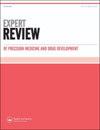严重癫痫的基因组测序:向精准医学迈进了一步
IF 1.2
Q4 PHARMACOLOGY & PHARMACY
Expert Review of Precision Medicine and Drug Development
Pub Date : 2020-02-25
DOI:10.1080/23808993.2020.1732203
引用次数: 4
摘要
摘要:大量不同的综合征和癫痫发作类型,以及个体间对抗癫痫药物(aed)的不同反应,使得癫痫的治疗具有挑战性。涵盖领域:早期婴儿癫痫性脑病(eee)是一组神经发育障碍,包括早发性难治性癫痫发作,通常伴有重要的发育迟缓或倒退。在过去的二十年中,癫痫的诊断取得了重大进展,这不仅归功于现代神经成像,而且主要归功于分子遗传学和基因测序的新方法。新一代测序(NGS)技术的应用已经有助于了解儿童严重癫痫的遗传多样性和潜在致病机制。此外,使用全外显子组测序(WES)在父母-后代三人组中也有助于识别eee患者的新生突变。量身定制的治疗方法已经适用于一些单基因癫痫,但这只是少数病例。专家评论:在我们看来,未来的癫痫治疗将是多学科的,可能与目前几乎是经验主义的方法大不相同,我们有信心“精准医学”将大规模适用。本文章由计算机程序翻译,如有差异,请以英文原文为准。
Genomic sequencing in severe epilepsy: a step closer to precision medicine
ABSTRACT Introduction: The large number of different syndromes and seizure types, together with an inter-individual variable response to antiepileptic drugs (AEDs), makes the treatment of epilepsy challenging. Areas covered: Early infantile Epileptic encephalopathies (EIEE) are a group of neurodevelopmental disorders consisting of early-onset refractory seizures often accompanied by important developmental delay or regression. The last two decades have seen major advancement in the diagnosis of epilepsy thanks both to modern neuroimaging but, primarily, to new methods in molecular genetics and gene sequencing. The application of Next-Generation Sequencing (NGS) techniques has already helped to understand the genetic diversity and underlying pathogenic mechanisms in severe epilepsy of childhood. Furthermore, the use of Whole Exome Sequencing (WES) in parent–offspring trios has also helped to identify de novo mutations in patients with EIEE. Tailored treatments are already applicable in some monogenic epilepsy, but these are a minority of cases. Expert commentary: In our opinion, the future of epilepsy treatment will be multidisciplinary and possibly very different from the currently almost empiric approach and we are confident that a ‘precision medicine’ will be applicable on large scale.
求助全文
通过发布文献求助,成功后即可免费获取论文全文。
去求助
来源期刊

Expert Review of Precision Medicine and Drug Development
PHARMACOLOGY & PHARMACY-
CiteScore
2.30
自引率
0.00%
发文量
9
期刊介绍:
Expert Review of Precision Medicine and Drug Development publishes primarily review articles covering the development and clinical application of medicine to be used in a personalized therapy setting; in addition, the journal also publishes original research and commentary-style articles. In an era where medicine is recognizing that a one-size-fits-all approach is not always appropriate, it has become necessary to identify patients responsive to treatments and treat patient populations using a tailored approach. Areas covered include: Development and application of drugs targeted to specific genotypes and populations, as well as advanced diagnostic technologies and significant biomarkers that aid in this. Clinical trials and case studies within personalized therapy and drug development. Screening, prediction and prevention of disease, prediction of adverse events, treatment monitoring, effects of metabolomics and microbiomics on treatment. Secondary population research, genome-wide association studies, disease–gene association studies, personal genome technologies. Ethical and cost–benefit issues, the impact to healthcare and business infrastructure, and regulatory issues.
 求助内容:
求助内容: 应助结果提醒方式:
应助结果提醒方式:


